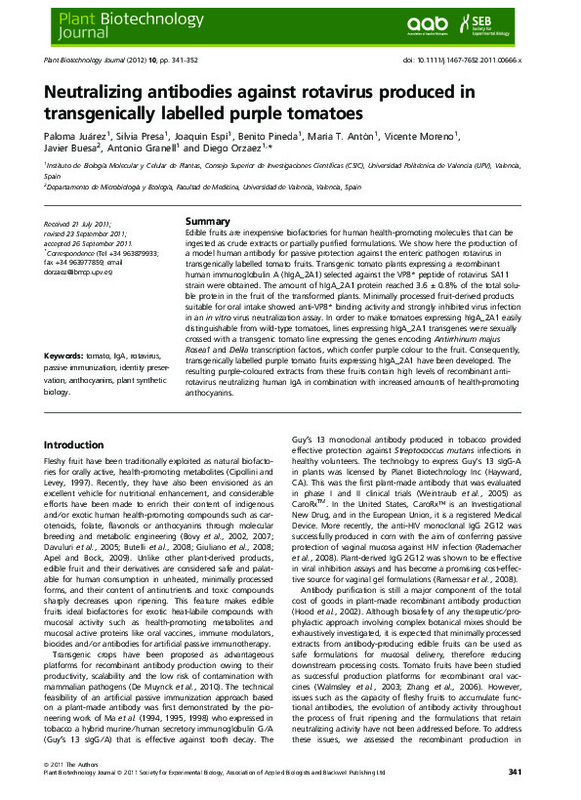JavaScript is disabled for your browser. Some features of this site may not work without it.
Buscar en RiuNet
Listar
Mi cuenta
Estadísticas
Ayuda RiuNet
Admin. UPV
Neutralizing antibodies against rotavirus produced in transgenically labelled purple tomatoes
Mostrar el registro completo del ítem
Juárez Ortega, P.; Presa Castro, S.; Espi, J.; Pineda Chaza, BJ.; Antón Martínez, MT.; Moreno Ferrero, V.; Buesa, J.... (2012). Neutralizing antibodies against rotavirus produced in transgenically labelled purple tomatoes. Plant Biotechnology Journal. 10:341-352. doi:10.1111/j.1467-7652.2011.00666.x
Por favor, use este identificador para citar o enlazar este ítem: http://hdl.handle.net/10251/73650
Ficheros en el ítem
Metadatos del ítem
| Título: | Neutralizing antibodies against rotavirus produced in transgenically labelled purple tomatoes | |
| Autor: | Juárez Ortega, Paloma Espi, Joaquin Antón Martínez, María Teresa Buesa, Javier | |
| Entidad UPV: |
|
|
| Fecha difusión: |
|
|
| Resumen: |
[EN] Edible fruits are inexpensive biofactories for human health-promoting molecules that can be ingested as crude extracts or partially purified formulations. We show here the production of a model human antibody for ...[+]
|
|
| Palabras clave: |
|
|
| Derechos de uso: | Reconocimiento (by) | |
| Fuente: |
|
|
| DOI: |
|
|
| Editorial: |
|
|
| Versión del editor: | https://dx.doi.org/10.1111/j.1467-7652.2011.00666.x | |
| Código del Proyecto: |
|
|
| Agradecimientos: |
We want to thank Prof. Cathie Martin and Dr. Eugenio Butelli for kindly providing us with Del/Ros1 plants, Dr. Monedero for the gift of scFv and VP8* clones and Dr. Ann Powell and Dr. Anna N. Stepanova for carefully ...[+]
|
|
| Tipo: |
|









